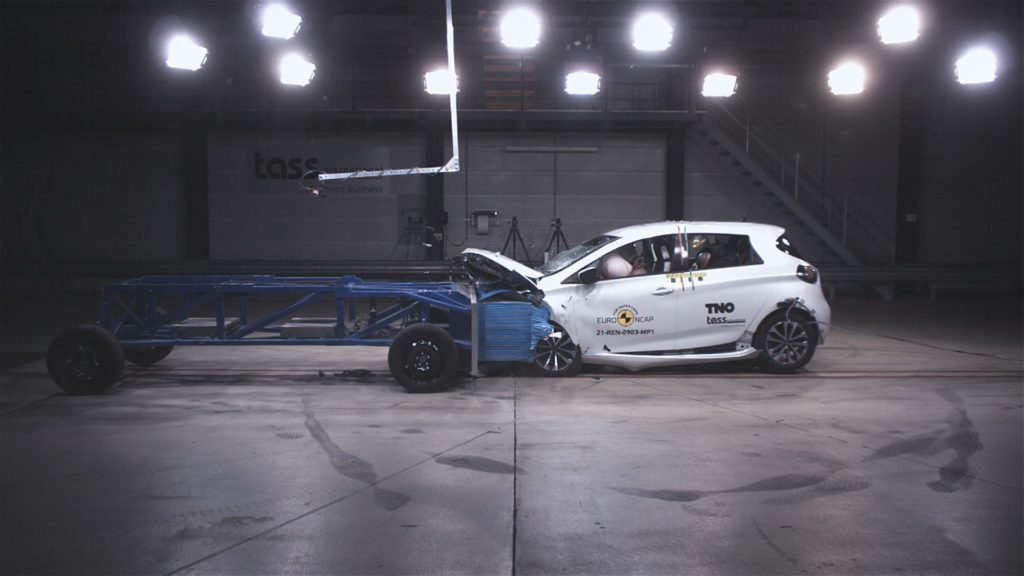The Renault Zoe has become the third car in history to be awarded a zero-star rating by Euro NCAP, following the latest round of safety testing by the organisation.
Renault Group’s Dacia Spring also scored poorly, achieving just one star out of a possible five. Testing saw other carmakers achieve the industry-leading five-star standard for their latest models.
The Renault Zoe was one of the first mainstream mass-produced battery-electric vehicles (BEVs) launched, having gone on sale in 2013. The carmaker offered an upgraded model in 2017. However, some safety elements were removed and this, coupled with increasing standards for Euro NCAP testing in the intervening years, saw the model achieve the unwanted stain on its reputation.
Zero-star
Only Fiat has ever achieved a zero-star rating for a vehicle, doing so twice with the Punto and Panda in 2017 and 2018, respectively. These models had not been updated in several years as the carmaker failed to invest in them, leading Euro NCAP to retest and ascertain just how safe they were compared to modern standards.
The Renault Zoe saw a facelift launched four years ago. However, according to Euro NCAP, at this time, certain safety equipment was downgraded. Specifically, seat-mounted head and thorax side-protection airbags were removed, and thorax-only units were added.
In the frontal offset crash, the results were rated as ‘poor’, specifically due to weak protection for the chest area of the driver-side dummy. But it was Euro NCAP’s severe side-pole test that revealed the most drastic results, with the driver’s head directly impacting the intruding pole.
Thatcham Research, which undertakes testing for Euro NCAP, highlighted that the red body parts seen on the dummy in the image below show a potential threat of serious injury and threat to life in the event of an accident.

The test replicates real-world impacts involving a vehicle travelling sideways into rigid roadside objects such as trees or poles. According to Thatcham Research, 33% of these impact types are classified as fatal or serious accidents. As the forces on the car are so localised, the pole can end up deep inside the passenger compartment.
‘It is a serious concern to see results like this in 2021, especially from a carmaker which has previously performed well in Euro NCAP testing,’ said Matthew Avery, Thatcham Research’s chief research strategy officer and Euro NCAP board member. ‘Renault was the first to achieve the full five-star rating in 2001, in part because it was also the first to include a combined head and thorax airbag in the Laguna 2. Although this was a new and revolutionary safety measure at the time, today this airbag is available on most modern cars.
‘Unfortunately, a conscious decision has been made to remove the head protection from this vital passive-safety feature, by the brand that pioneered the use of it. As a result, the safety of occupants within the vehicle has been severely impacted.’
Safety systems
The Renault Zoe also lacks active-safety technology commonly fitted as standard in most new vehicles, such as lane-departure warnings and standard-fit autonomous emergency braking (AEB). This led to a 14% score in the Safety Assist category, 61% lower than the average (75%) achieved by carmakers in the same category this year.
The Dacia Spring fared slightly better with a one-star rating. In its review, Euro NCAP stated: ‘The Spring’s performance in crash tests is downright problematic, with a high risk of life-threatening injuries for the driver’s chest and rear passenger’s head in frontal crash tests and marginal chest protection in a side impact. The mediocre crash performance and poor crash-avoidance technology result in a one-star rating.’
Unlike the Fiat Punto and Panda, the Zoe is unlikely to be pulled from sale due to the zero-star rating. Indeed, Fiat stopped sales of the Punto prior to the results being made public. The Zoe is an important car for Renault, as its leading BEV model and one which is synonymous with electric technology and pioneering spirit at the carmaker.
The Spring, meanwhile, is poised to lead a low-cost BEV attack on the automotive market for Renault Group. It is heavily based on the Chinese-made Renault City K-ZE, itself a derivative of the Renault Kwid, sold in India and Brazil for several years.
‘Renault was once synonymous with safety. The Laguna was the first car to get five stars, back in 2001,’ commented Michiel van Ratingen, president of Euro NCAP. ‘But these disappointing results for the ZOE and the Dacia Spring show that safety has now become collateral damage in the group’s transition to electric cars. Not only do these cars fail to offer any appreciable active safety as standard, but their occupant protection is also worse than any vehicle we have seen in many years. It is cynical to offer the consumer an affordable green car if it comes at the price of higher injury risk in the event of an accident.’
Renault response
In response to an Autovista24 request, Renault stated: ‘We take note of the results published by Euro NCAP following specific tests on Zoe E-Tech Electric according to its new protocol implemented in 2020.
‘First of all, Renault reaffirms that Zoe E-Tech Electric is a safe vehicle, which complies with all regulatory safety standards. These standards are constantly evolving and are becoming more stringent in all domains, especially in safety. Renault therefore continually improves its offer in order to comply with the regulations applicable where its vehicles are sold. Zoe was launched in 2013 and received five stars with the Euro NCAP protocol at that time. The Euro NCAP protocol has, since 2013, undergone five changes. With the same equipment, a model can lose up to two stars in each protocol change.
‘The evolution of the current Zoe was decided in 2017, adapting the passive safety equipment to real accidentology and updating the car with state-of-the-art ADAS equipment such as advanced emergency braking with pedestrian and cyclist detection, lane-departure alert and lane-keeping assist, using a radar and a camera.’


 Close
Close